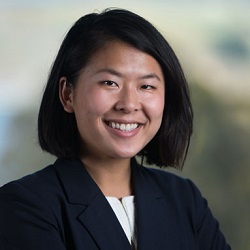The interview below is part of an ongoing effort by McGuireWoods to profile women leaders in private equity (PE). To read previous profiles, click here. To recommend a woman for a future interview, email WPEF@mcguirewoods.com.

Yichen Feng is a principal at Lumos Capital. She is a proud daughter of creative, bold and rebellious first-generation immigrants and a graduate of multicultural and working-class schools within the Los Angeles Unified School District.
Her work in the human development sector has moved between the public and private sectors, and most recently includes founding a primary school in Hayward, California.
Prior to Lumos, Yichen led Asia expansion for Nova Credit and was a technology investment banker at Goldman Sachs. She has advised early-stage education technology entrepreneurs at Village Capital, created television shows at Amazon Studios and started her career at Cisco’s in-house venture capital arm focused on emerging markets.
Yichen is a business council board member of the National Head Start Network and an RSF Social Finance Integrated Capital fellow.
She received an MBA from the Darden School of Business at the University of Virginia and a bachelor’s from Harvard University.
Q: What attracted you to PE?
Yichen Feng: If you told 21-year-old me that I would be an investment professional at a PE firm, I would have looked at you and asked, “What is PE?” My first job out of college was in emerging markets venture capital at a corporate venture fund for Cisco Systems, but I didn’t see it as the beginning of a career in PE. In fact, venture capitalism as a career was not on my radar at all. At the time, I was very interested in pursuing a career in international development and curious to understand how emerging economies were growing at a macro level. The role at Cisco allowed me to understand that from looking at how the private sector — specifically technology — was evolving in countries like Brazil, Russia, India, China and Mexico.
I have always used my social science training from college to see the world. The work analyzing all aspects of the economy with a focus on a particular sector gave me the opportunity to find a passion for technology as a sector and refine my skills around using capital as a tool to engage with the world. I stayed in the investment space because I still have so much to learn, and learning is such a central part of the job that it doesn’t ever stop. There are new use cases, emerging technologies and demographic shifts happening at all corners that constantly stress-test your hypothesis about how the future will look. It’s a never-ending course in the most unpredictable subject, which is the future.
Recently, I started to shift my attention to the concept of integrated capital, which is defined as the coordinated use of diverse forms of financial and social capital to support enterprises and strategies that address complex social and environmental problems. In other words, it’s using capital as a tool for social change.
Q: Why is it important for more women to pursue careers in PE?
YF: We need more models of success. Over the course of my career, I have had great mentors and also struggled to find people I looked up to at various times. One of my mentors when I worked in investment banking told me to “see my path,” meaning visualize what it would take to move up but also how it would fit into my unique journey. It helped tremendously that my firm at the time put a premium on retaining high-performing women, so I had role models who came from all walks of life and had different priorities while having achieved similar career success.
I make this career work for all of my quirks and oddities because I know one day I’ll meet an anthropology major who never thought about entering the world of finance but may reconsider after our conversation.
Q: Can you share a personal story that you feel exemplifies the value of women entrepreneurship?
YF: I find it rather amusing that there is an orientation to justify and/or elevate why it’s important to have more women engage in finance/entrepreneurship and the value of women’s participation, when in reality we have been doing this for centuries, especially in the Global South.
One great example is Nari Chetana Kendra/Women Awareness Center Nepal (WACN), which I learned about last year through my dear friend who runs the fund of one of their partners, Thousand Currents. Over a decade ago, WACN — which represents 42 cooperatives and more than 45,000 women — got to a certain scale where it made sense to start thinking about starting its own bank. WACN realized that the traditional banking model offered in the market had minimum balance requirements. This left out the poorest members of society. WACN largely works in these communities and, therefore, decided to design a model of banking that would work for its constituents, refusing to accept the “standard” banking model.
WACN’s design was so successful that women in these locations started to leave the standard banks to join the cooperatives to benefit from the lending rates that were much fairer and highly competitive. In turn, traditional banks dropped their lending rates.
This is very personal to me because we invest for financial and social returns. I think often about how these models translate into actionable insights for our stage and thesis.
Q: What is the best piece of advice you have received?
YF: I quite enjoy fishing. One of my favorite fishing adages is, “The best fisherman is the one who has the most fun.” There are many ways to measure success. For me, whether I’m enjoying the journey is my favorite barometer.
To contact Yichen Feng, email yichen@lumoscapitalgroup.com.